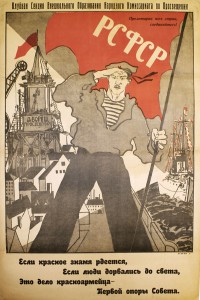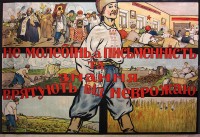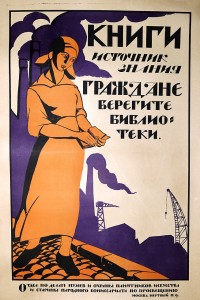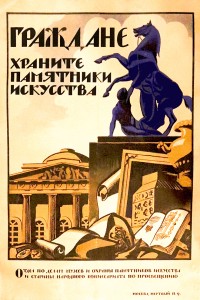Narkompros (People’s Commissariat for Education)
The People's Commissariat for Education (Narkompros) was formed in 1918 and it encompassed the former Imperial Ministry of Public Education, the State Education Committee, and the former Palace Ministry (an entity that managed theaters, the Academy of Arts and the royal palaces). Overseeing Narkompros was the All-Russian Central Executive Committee (VTsIK). As the main educational branch of the government, Narkompros carried out a compliment of programs such as the combating of illiteracy, professional education, adult education, and increasing public arts through its Proletkult (proletarskaya kultura) division. In 1922, state censorship was regulated via the office of Glavlit (Main Administration for Literature and Publishing of the People's Commissariat for Education)-- the censorship authority over Narkompros. Referred to as "control"; all publishing, live performances and public speeches were scrutinized by Narkompros editorial boards for potential security risks. Anatoli Lunacharskii, an art critic, author and journalist, headed Narkompros until 1929. In 1946, Narkompros was re-organized as the Ministry of Education.
Fuentes
Jaffé, D. (2012). Historical dictionary of Russian music. Lanham: Scarecrow Press. (P. 244, People’s Commissariat of Public Education, bio)
Leach, R. (1994). Revolutionary theatre. London: Routledge. (section on Proletkult)
Koenker, D., et al. (1989). Party, state, and society in the Russian Civil War: Explorations in social history. Bloomington: Indiana University Press. (section on Narkompros)
Fitzpatrick, S. (1970). The commissariat of enlightenment: Soviet organization of education and the arts under Lunacharski. Cambridge: Cambridge University Press. (sections on Narkompros and on Anatoli Lunacharskii)
![PP 139: Solo el régimen soviético puede llevar a las masas trabajadoras hacia la luz y la ilustración.
[Publicado por] La División de Asociaciones del Departamento de Extramuros del Comisariado del Pueblo para la Educación.](https://www.posterplakat.com/thumbs/the-collection/posters/pp-139/pp139-200x299.jpg)
![PP 468: La Asociación de Trabajadores es el corazón del pensamiento revolucionario.
[Parte inferior izquierda] Sección de la Asociación del Departamento de Extramuros del Comisariado de Educación Pública.](https://www.posterplakat.com/thumbs/the-collection/posters/pp-468/pp468-200x297.jpg)


![PP 861: Lenin y el campesinado.
“El campesino diligente es una figura central de nuestro desarrollo económico.” – Lenin
[Traducción parcial]](https://www.posterplakat.com/thumbs/the-collection/posters/pp-861/pp-861-catalog-image-200x147.jpg)

